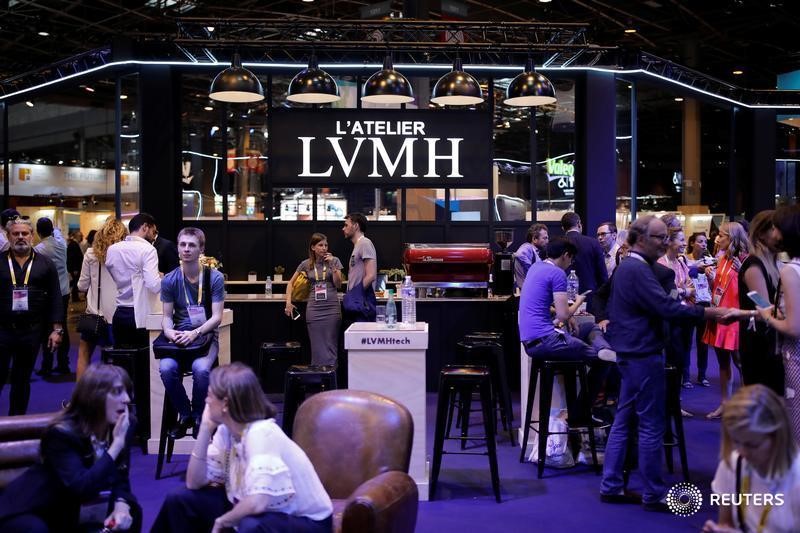By Christiana Sciaudone and Liz Moyer
Investing.com -- As long as there are Kardashians and Kardashian wannabes, there will be room for luxury.
And when we say luxury, we mean none less than retail, wine and hotelier giant LVMH, or LVMH Moet Hennessy Louis Vuitton SE (PA:LVMH).
LVMH is poised to close its admittedly messy deal with Tiffany, which will only elevate it to an ever greater status as the world’s quintessential company catering to the wealthiest among us, as well as those who aspired to be so.
But LVMH was not immune to the retail sector's struggle this year amid pandemic-related shutdowns that changed consumer behavior.
Investing.com's Christiana Sciaudone argues the favorable case to invest in LVMH, while Liz Moyer explains there is reason to be cautious.
The Bull Case
Tiffany's blue box brand will add more than $4.3 billion a year to LVMH’s coffers -- in a non-Covid year, that is -- but more importantly, it will expand the brand’s presence in jewelry.
The company’s jewelry and watch segment is its smallest, bringing in about $5.3 billion in 2019. Tiffany will bump the segment from last place to third behind fashion and leather goods and selective retailing, ahead of wine and spirits and perfumes and cosmetics. More than that, it will bring a household name to the company, whose brightest brands are Bulgari, Hublot and Tag Heuer.
Tiffany isn’t the only acquisition in line for LVMH. It’s buying a minority stake in WhistlePig, a rye whiskey maker, a drink that is drunk mainly in the U.S. -- for now. Moët Hennessy will bring the drink to customers around the world. WhistlePig The Boss Hog Vth Edition: “The Spirit of Mauve” retails for about $739.99.
If anyone is going to succeed in bringing an American whiskey to connoisseurs around the world, it’s LVMH. The behemoth behind Veuve Clicquot and Dom Perignon is trading at a record high, and boasts a market cap of 256 billion euros, the largest company in France and the second largest in Europe after Nestle. That valuation compares to Cartier-owner Richemont’s 41.5 billion euro market cap.
And not only do LVMH stores have global reach, it also owns the Belmond hotel brand located from Brazil to Cambodia and media including Le Parisien to increase its reach.
Like many retailers, LVMH got hit hard by the pandemic. After seeing record revenue of 15.3 billion euros in the fourth quarter of 2019, it reported sales of 7.8 billion euros in the second quarter of 2020. But, that climbed back up to 11.9 billion euros for the third quarter as luxe started to rebound.
The quarter saw a “strong rebound” in activity with double-digit organic revenue growth for the fashion and leather goods segment, with Louis Vuitton showing “exceptional momentum and creativity, in all areas, from products to shows and events.”
China results were also improving for the watches and jewelry business, and champagne seems to be back in fashion for the third quarter.
But why even bother buying high-end goods when one can hardly leave the house? People “may buy something because it is trendy or it has a really cool design or because he or she is feeling blue and needs a pick-me-up. It is someone who cares less about durability and more about emotional satisfaction and appeal,” according to Lee Eisenberg’s 2009 book, Shoptimism: Why the American Consumer Will Keep on Buying No Matter What.
And, tell us, who doesn’t need a pick-me-up in 2020?
The Bear Case
The pandemic has dramatically changed consumer behavior. Since the first stay at home orders this spring, people have hunkered down at home in comfortable clothing, unconcerned with personal grooming to any great extent because they were working from home.
Shopping moved from the mall -- which was shut or forced to curtail occupancy -- to online sites. And the browsing and scrolling favored big retailers like Walmart (NYSE:WMT), Target (NYSE:TGT) and Amazon (NASDAQ:AMZN) and less so luxury goods sellers and upscale department stores like Nordstrom (NYSE:JWN) and Neiman Marcus.
So, it’s no wonder revenue is down, and so is profit. Based on the outlook, profit could fall this year an estimated 41%, while revenue could be down 16% when all is said and done.
That will rebound when the pandemic goes away and people have the ability to freely shop in malls and department stores again, sure. But how long that takes is anyone’s guess.
LVMH owns 75 main brands such as Louis Vuitton and Fendi over five different businesses, including fashion and leather (which has been about half of sales this year through September), selective retail stores (about one-quarter), fragrance and cosmetics (about 10%), watches and jewelry (less than 10%) and wines and spirits (about 10%).
This year it made splashy deals -- the controversial one for Tiffany & Co (NYSE:TIF). and one announced this week for a specialty whiskey maker -- but those beef up its two smallest contributors, sales-wise.
Meanwhile, its biggest businesses are contributing the most pain. Fashion and leather organic revenue is down 11% after gaining 17% last year, according to Motley Fool. Retailing is down 31%, and fragrance and cosmetics fell 25%.
Motley Fool notes the clothing lines and spirits businesses staged a comeback in the third quarter -- perhaps there was plenty of pent up demand for chic clothes and expensive alcohol when stores were finally allowed to reopen to the shopping public.
With the holiday season upon us, LVMH has a few things going for it. It’s high-end clientele is perhaps less affected in the pocketbook than more ordinary consumers. But aspirational brands tend to attract buyers who may be reaching a little financially to have a luxury handbag, and that aspirational buying may be tough during these volatile economic times.
Subdued holiday celebrations also don’t bode great for sales of champagne and top shelf liquor. LVMH investors may have to wait a while to pop the cork.
